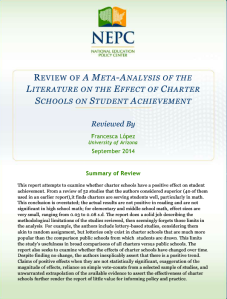Cloaking Inequity: Is the Impact of Charter Schools on Achievement a Big Lie?

I have been called a charter school “lover” and a charter school “hater” in the same week. Are both true? Neither? I think we as a society must be pragmatic on charters. I recently had a conversation with my grandmother, who was a lifelong educator at a middle school in Saginaw, Michigan. She explained to me that based on what she had read in the newspapers and seen on TV— that charter schools had some promise. I think the jury is still out. In this post I will introduce my podcast on the education view on charters, include a new review of charter schools and student achievement released by the National Education Policy Center and then conclude with my comments on the new Edweek blog.
First here is a link to my interview with the Educational View on holding charters accountability for equity. I based my conversation on the post Don’t Trust Charters More than a Sweaty Used Car Salesman (A Citizen Research Template) where I lay out a citizen research template for parents and other stakeholders to study and understand the equity context for any particular charter school or charter chain. Click the link in the tweet below for the five minute broadcast.
Dr. Mike Robinson
@DrMikeRobinson
Educational View " The Trouble with Charter Schools" by Dr. Julian Vasquez Heilig @ProfessorJVH http://forestoftheraineducation.weebly.com/this-weeks-educ...
8:40 PM - 28 Sep 2014
2 RETWEETS
Today, NEPC released a review of the CRPE report entitled A Meta-Analysis of the Literature on the Effect of Charter Schools on Student Achievement CPRE argued that,
- Charter schools on average produce results that are at least on par with and, in many cases, better than district-run public schools
- Charter schools are producing higher achievement gains in math relative to their district-run counterparts in most grade levels, particularly in middle school, and gains in reading that are similar to district-run schools in reading
- Charter school effect size has risen for both math and reading over time, though this trend is not statistically significant
- A small and growing body of literature on the relationship between charter school attendance and outcomes apart from achievement finds further evidence of large positive impacts of charter schools on high school graduation, college enrollment, and behavioral issues
The National Education Policy Center commissioned a peer review of the report by Francesca Lopez at the University of Arizona. Click here for the full brief.
So what about that charter Kool-Aid? Her findings:
This report attempts to examine whether charter schools have a positive effect on student achievement. From a review of 52 studies that the authors considered superior (40 of them used in an earlier report),it finds charters are serving students well, particularly in math. This conclusion is overstated; the actual results are not positive in reading and are not significant in high school math; for elementary and middle school math, effect sizes are very small, ranging from 0.03 to 0.08 s.d. The report does a solid job describing the methodological limitations of the studies reviewed, then seemingly forgets those limits in the analysis. For example, the authors include lottery-based studies, considering them akin to random assignment, but lotteries only exist in charter schools that are much more popular than the comparison public schools from which students are drawn. This limits the study’s usefulness in broad comparisons of all charters versus public schools. The report also seeks to examine whether the effects of charter schools have changed over time. Despite finding no change, the authors inexplicably assert that there is a positive trend. Claims of positive effects when they are not statistically significant, exaggeration of the magnitude of effects, reliance on simple vote-counts from a selected sample of studies, and unwarranted extrapolation of the available evidence to assert the effectiveness of charter schools further render the report of little value for informing policy and practice.
In conclusion, I just recently started a discussion with Dr. Jack Schneider on EdWeek’s Beyond the Rhetoric opinion on a variety of topics (See Introducing Julian Vasquez Heilig). EdWeek has placed our conversation behind a paywall. Since EdWeek has not compensated me for contributing in any way, in my view, I still own my work. So below I will include only my own language. I don’t believe I have the right to include Jack’s questions/probes, so you will have to guess what Jack asked me between questions or subscribe to EdWeek. Sorry. :)
The first conversation was entitled Charters and the Profit Motive. It ran on 9/22/14.
Jack Schneider:
Julian Vasquez Heilig: Charters are quite diverse. Just the word can set off critics and supporters. The challenge, as I see it, is to decouple the persona of charters from the positive and negative realities of their diversity.
Schneider:
Heilig: The types of charters and the chartering process varies greatly from state to state. So I think we have to decide as a nation what types of charters we really desire. For example, compare for-profit charters with community-based charters.
The issue with for-profit charters is the same issue that we often face with corporate malfeasance—the profit motive can overwhelm honesty and integrity. We thereby sacrifice serving students regardless of their circumstance, an important aspect of our national social contract for public education. We must also consider the quasi-private policies found in many corporate charters that have implications for equity and excellence.
By comparison, a charter school like Travis Heights Elementary in Austin, Texas, where the local school district, parents, teachers union, and faith community came together to build a community-based charter school, is a welcome contrast to corporate, profit-driven charter schools.
Schneider:
Heilig: Charter governance differs across states. For example, in Michigan, 61% of charters are run on a for-profit basis. An important question for the nation is whether we think charters on a for-profit basis are a desirable approach. We also need to consider whether communities should be able to veto corporate charters and for-profit charters if they so choose.
I also think we need to reframe our conception of choice. Why can’t communities access desirable characteristics in their neighborhood traditional schools? Why have Louisiana and Michigan created achievement authorities that turn a blind ear to community input? Who is actually doing the choosing for our communities? Also, we must continue to grapple with the question of whether the freedom that charters have received is being abused. Equity and access for students of different kinds and workplace conditions for faculty and staff are important questions that we are continually grappling with in our ongoing research.
Schneider:
Heilig: I don’t think we should limit ourselves to the current state of charters. Instead, I think we need to consider what the evolution of charters will be. Yes it is true that in most states charters are not for-profit. But we already have plenty of data and research to understand the pitfalls of for-profit charters in Michigan, Arizona and elsewhere. The Detroit Free Press recently conducted several investigative reports of charters in Michigan that uncovered wasteful spending, lack of accountability, nepotism, and corruption. Further, overall charter performance was no better than traditional public school performance.
Our final conversation on charters was What’s a ‘Corporate’ Charter? It posted on 9/25/14.
Schneider:
Heilig: I use “corporate” as a term to describe the large chains and franchises that are dominating and leading the charter movement—KIPP, BASIS, Rocketship, Great Hearts, etc. They are schools that, as you said, are typically controlled externally to the communities in which they are located.
There are, of course, community-based charters. I mentioned previously Travis Heights charter school, which was founded by community and stakeholder groups. The question is: do we need corporations to run our schools or should we allow local community-based organizations the authority and resources to design and run schools? The recent political battle between the IDEA corporate chain of charters and local community groups in Austin was an example of this tension.
Schneider:
Heilig: I would argue that what we do in an imperfect world is to hold charters to the same standards (equity, access, and achievement) that we hold traditional public schools. No special favors or double standards. Being that charters are purportedly a better choice, if they fail at this mission and underperform traditional public schools, close them, no excuses.
This blog post has been shared by permission from the author.
Readers wishing to comment on the content are encouraged to do so via the link to the original post.
Find the original post here:
The views expressed by the blogger are not necessarily those of NEPC.



